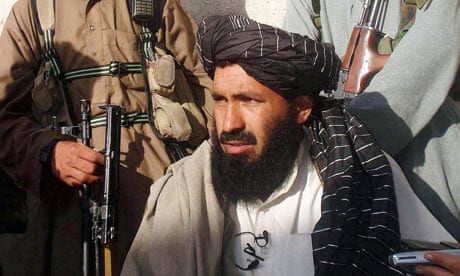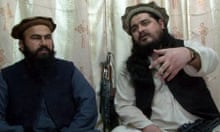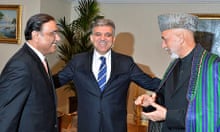A top Taliban leader who quarrelled with other militant factions over his refusal to attack the Pakistani government was killed by an unmanned US drone , security officials have claimed.
Mullah Nazir was reportedly holding a meeting at the time of the missile strike with other senior leaders of his group in a building in Birmil in South Waziristan, one of the troubled tribal regions where the Taliban, al-Qaida and other militant groups have based themselves.
The first reported drone strike of 2013 was followed by another attack in North Waziristan at around 9am . That attack reportedly involved four separate missile strikes on a vehicle in Mubarakshahi, a village near Miran Shah. Because journalists are usually prevented by militants from visiting places hit by drones, the exact details of what happened and who was killed in such attacks are often extremely hard to verify.
Residents and an intelligence official in South Waziristan who spoke to a local journalist said the total number of people killed in the first attack was either six or 10. The intelligence source said all the men killed were "top leaders" of Mullah Nazir's group, the leading militant group in South Waziristan.
Reuters, citing a number of different security sources, reported Nazir's deputy commander, Ratta Khan, was also killed, along with eight others. Neither the Pakistani government nor the Taliban have so far made an official statement.
Critics of Pakistan's policies in Waziristan say Nazir had long enjoyed some degree of official protection because he promised not to attack Pakistani soldiers or government facilities. Under an agreement with other leading militant groups struck in early 2012, Nazir instead focused his efforts on attacks inside Afghanistan against Nato and Afghan government forces. Some locals have credited the agreement with an upsurge in business and development activity in his area of control in South Waziristan.
But the deal angered other factions, not least the Tehrik-e-Taliban Pakistan (TTP) – the Pakistani Taliban – which continues to mount bloody attacks against the government.
In November, Nazir was wounded in a suicide attack on his vehicle as he travelled through the bazaar in the town of Wana. No group claimed responsibility, although some have accused TTP members of the Mehsud tribe who had been displaced from their own areas by attacks from the Pakistani military.
Nazir had tried to order the Mehsud people out of his area shortly before the attack by a teenage bomber on a motorbike.
Imtiaz Gul, a leading security analyst, said that despite the non-aggression deal the Pakistani state was likely to privately welcome Nazir's demise because he had long sheltered government enemies.
"Both the US and Pakistan will be happy because they now have one less enemy," he said. "Although he was in an undeclared peace deal with the government, he was also subverting the stated goals of that agreement by providing support and shelter to al-Qaida people whose leaders have pleaded with the rank and file of the Pakistani army to rebel against the state."
In the summer he became the second leading militant in the tribal areas to ban the work of polio vaccinators in his area of control until strikes by US drones came to an end.
He claimed the health workers were using their work as cover to collect intelligence used by the CIA to target militants with drones.
Drone strikes are enormously unpopular in Pakistan as many people believe they not only violate Pakistani sovereignty but also kill large numbers of civilians.
The US, however, believes it operates its drone campaign with some degree of official consent from the Pakistani government, even though the country's foreign ministry often lodges a diplomatic complaint after each strike.
US officials also believe the attacks are extremely accurate and rarely kill civilians, although it never provides detailed evidence to back up those claims as officials are legally barred from talking publicly about a CIA programme that although conducted in the open is still technically clandestine.


